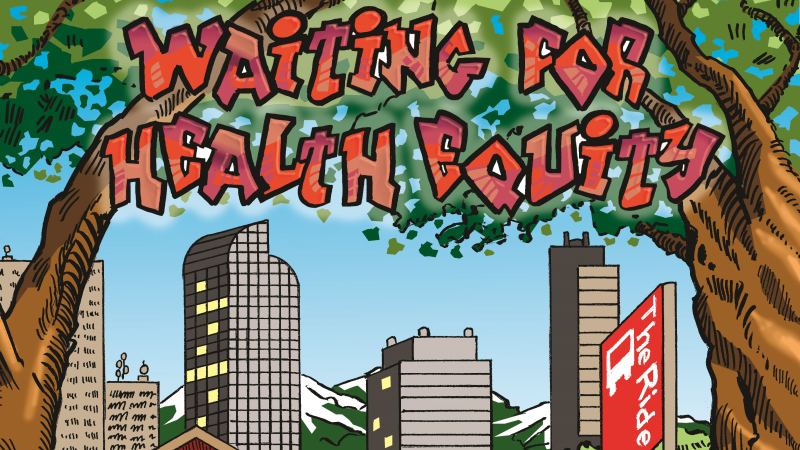Waiting for Health Equity: A Graphic Novel
Leer en español
An image from a new graphic novel written by the Colorado Coalition for the Medically Underserved. Illustrated by Ruben Chavez
By Aubrey Hill
Colorado consistently ranks as one of the healthiest states in the nation, but that’s a hollow achievement when so many Coloradans are facing real health challenges that often stem from a lack of equitable and quality health care. Health inequities, or the preventable differences in health outcomes across certain groups or populations, persist across our state. They’re preventable because they’re caused by the systems and structures within our society that advantage some people over others, based on factors like race, income, sexual orientation, immigration status and more.
The Colorado Coalition for the Medically Underserved (CCMU) is proud to be a grantee of The Colorado Trust’s Health Equity Advocacy Strategy, and to have the opportunity to work with and learn from the many other experts in the cohort and in the field on these issues. We have worked over the last three years, both internally and with partners, to understand the root causes of health inequities, so we can find ways to dismantle the structures that perpetuate them, and rebuild systems that get us closer to achieving health equity as a state.
To reach our shared goals, Colorado needs well-informed data and perspectives. We need tools to start new conversations—ones that provide context for the barriers we face and build empathy for the experiences of others. We also need to challenge our own perspectives and privilege, to unpack the historical and institutional oppression that has led us to where we are today.
We want to encourage that dialogue, so today we’re releasing the first chapter of our graphic novel, Waiting for Health Equity, and we’ll release one chapter per week for the next seven weeks. This project is an attempt to humanize the cumulative effects of public policies and systemic structures that have, either intentionally or unintentionally, set up certain groups of people to benefit more than others. This is also known as institutional racism and classism, and it translates into worse health outcomes for many Coloradans.
Based on two years of intensive research and conversations with experts in the field, we tell the fictionalized accounts of Damian, a little boy whose asthma can be traced back through the generations of his family denied opportunity to grow their income, assets and education because they’re black. And of Laura, an aging lesbian whose experiences in her youth shaped her fear and avoidance of the health care system. And of Anh, a refugee from the Vietnam War whose poor health is directly correlated to the limits placed on him by our immigration and workforce development systems. And of Manuel, Claudia, Tamara and Jake, who all have their own unique stories to tell. Even though the characters aren’t real, the stories of the systemic barriers that prevent people from achieving their full potential are all too grounded in reality.
We hope that Waiting for Health Equity will make you think more deeply about the inequities facing many Coloradans and the policies and structures that led to these issues. We also hope it encourages a sense of urgency—that we must prioritize the dismantling of the systems that are perpetuating health inequities. Achieving health equity is a big and complex job, but thankfully, none of us is alone in tackling it. Together, we can correct the economic, social and racial disparities that have limited our potential, and the potential of our neighbors, for far too long.
Chapter two will be released on Wednesday, March 1, at ccmu.org/wfhe. Happy reading!